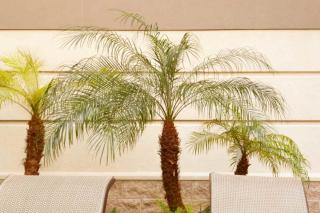

Pygmy date palm or Phoenix roebelenii is a palm tree often grown indoors.
Key Pygmy date palm facts
Name – Phoenix roebelenii
Family – Arecaceae
Type – indoor plant
Exposure – well-lit, part sun
Soil – soil mix
Foliage – evergreen
The Phoenix is said to be the palm tree that best adapts to growing inside houses and apartments. It bears thin, elegant green leaves.
The pygmy date palm requires good soil mix that can be amended with ⅓ compost, if you’ve got any.

This will help ensure that its roots won’t wallow in water, which could be fatal.
Just as might be done in pots, feel free to place a bed of gravel, small stones or clay pebbles to ensure proper drainage.
It’s easy to propagate your pygmy date palm. Simply separate the shoots that sprout from the base, and plant them in nursery pots filled with soil mix.
Under our climates, pygmy date palm adapts well to living indoors in our homes and apartments.
Choose for it a place near a window facing to the South or West so that it would bathe in a good deal of both indirect light and sunlight.
If you live in a house that is quite dark, avoid purchasing a pygmy date palm because it won’t cope well with the lack of luminosity.
Pygmy date palm or Phoenix roebelenii can withstand the dry heat of a house or apartment in winter, but it will feel better if the room is a bit cooler in winter, ideally between 50 and 60°F (10 and 15°C).
The watering of your pygmy date palm is important because it should neither be too much nor too little. Finding the right balance is the key…
This is usually the time of the year when the Phoenix roebelenii pygmy date palm grows most.
Water regularly while letting the soil mix dry in the surface before watering again.
Watering must be regular but limited, in order to not suffocate the plant’s roots.
Start reducing the watering because the plant’s water needs begin to decrease.
Only when the soil is dry down to the first inch or so (a couple centimeters), water to moisten the soil mix again.
The most common pygmy date palm parasites are red spider mites and mealy bugs. In the first case, tiny webs appear at the junction point of leaves, whereas in the second case a feathery whitish mass appears along leaves and stems.
Of course very aesthetic, this palm tree native to Mauritius is resilient and very easy to grow and is one of the most appreciated and often-purchased indoor plants.
Its foliage is particularly elegant and unique, and its thick trunk brings a touch of exotic life to a living room, dining area, or any other room of the house that is well-lit.
Indoors, absolutely avoid direct sun because this would dry the plant out.